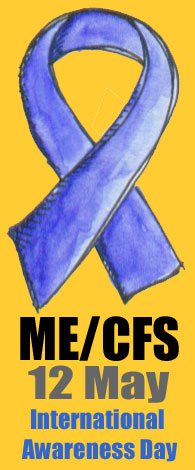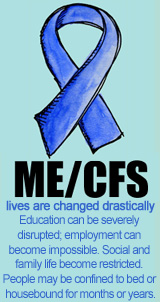I follow the blog of a young (at least in comparison to me!) teacher who has recently been afflicted by something that sounds very like ME, although I hope for his sake it isn't. Nonetheless, he's laid low at the moment, and has just had to pull out of a long-planned long distance cycle ride.
He's blogged about his feelings about all this. As can be imagined, he's utterly fed up. He feels he is letting people down, and he's worrying about his longer term future.
These are feelings I know only too well, as does everyone else with a chronic condition. I think that People With M E (PWME hereafter) have a special extra burden to bear because of the "controversial" nature of our condition. PWME have a habit of looking quite well when we aren't crashed out on a sofa. We can walk and talk and stuff just like everyone else. It's just that we can't do it for as long, or as quickly. Sometimes, if we stand up too quickly, or bend over rapidly, the game is over. I usually have a couple of really good hours per day in me, and I've learnt how to run my life so I can, to a point, choose when to use them. See me in those two hours, and I look fine.
PWME also have to deal with history of cynicism toward their illness. It was once called "yuppie flu" in the press, and derided as a licence to malinger. There are still vigorous remnants of that attitude to be encountered amongst medical professionals, those who decide eligibility for assistance and a lot of other folk who ought to know better. Charlatans and quacks offer ineffective and inappropriate cures, and in the UK appear to have successfully convinced Government agencies in the case of Graded Exercise Therapy.
What M E needs is what the medics call a "sign" - a clear identifying symptom. The classsic example of this, as well as being a classic piece of medical black humour, is "Custer's sign". This relates to victims of severe traumas like a car crash. If a male victim is found to have an erection on admission, it is an indicator that he has broken his back and may well be paralysed from the break down - hence "Custer's last stand". He's got a real problem, but at least he has no need to convince anyone of it.
M E is much more nebulous thing. Convincing the authorities we are ill is a laborious process. This leads to worry, about being believed, about whether we will have an income, about the progress of the illness. We feel guilty because we are not pulling our weight, we are leaving tasks for others, and we wonder if we have turned into malingerers overnight. On top of all this we are actually quite ill with a condition that varies, but is often highly disabling. Our thought processes are slow, we are forgetful, we are not able to organise easily.
So here's a new acronym - WIG - Worry, Illness, Guilt - for the burdens a PWME carries about. The worry and the guilt tend to worsen the condition, but are built into the experience of ME. Resolving that paradox is a key part of coping with the illness, and I wish all the M E affected readers of this blog success in finding a way through.
Thursday, 1 April 2010
Subscribe to:
Post Comments (Atom)












Richard- From my limited experiences of this illness up to this point, you have summed it up very well. I have had a really bad few days and am just about WIGed out!
ReplyDeleteThis is a great piece, Richard. I hope a lot of your "followers" read it. I think the problem with finding the one clear marker is that I don't think there's one illness that comprises ME. I think there are about six subsets. I say this because I have yet to find two people who have exactly the same symptoms. The only symptom we all seem to share is this bone-crushing fatigue.
ReplyDeleteMy daughter is designing a website for me and so I've been writing some text for it. I thought I'd copy and paste what I've written on chronic illness because it's relevant to what you've written. It's about the experiences that people with chronic illness share, but it especially applies to those with ME because, as you said, it's an invisible illness. Hopefully, this will add to the discussion. Here it is:
We often feel that it’s our fault we got sick – as if we’ve let our family and friends down. We know the challenges of adjusting to a life of relative social isolation. We know the experience of people not wanting to be near us, even though we’re not contagious. We get frustrated by the lack of understanding in the general public (and often the medical community) about the nature of chronic illness. We share that dilemma of how to “present” to the world: Do we spruce ourselves up to try to look our best (and risk people thinking we’re well enough to do anything), or do we let our physical demeanor reflect how sick we really are (and risk feeling guilty that we’re not doing enough to lift our spirits)?
haha well said Richard, you can add me to your army of WIGs!!
ReplyDeleteSo true Richard, a great post and summing up of the ME/CFS experience. I've been sick for fourteen years, diagnosed for eight and have yet to crack this code. Have you or anyone else figured out how to deal with WIG? Maya
ReplyDeleteI've had some success in dealing with worry and guilt by using mindfulness practices. Not mindfulness meditation. I find my bodily discomfort too uncomfortable to be able to sit (or even lie down) and meditate. But I do use mindfulness, in the sense of trying to bring my attention to the present moment. I try to consciously use it when worry and guilt get the better of me. Worry is about the future and, for me, guilt is about the past. I first acknowledge it's there (as in "oh, yes, here I am worrying again about whether I could care for my husband if HE got sick") and then I just say to myself "drop it." I don't push it away -- I drop it by focusing on something that's present for me right now -- a nice view of the garden, the sound of my dog barking, something the senses are aware of right now, in the present. It doesn't always work but it does sometimes and, these days, "sometimes" is a big accomplishment!
ReplyDeleteToni, I love that, what a great idea. I tend to find myself a bit to cognitively impaired to gain any real benefit from meditation, in the classical sense. But mindfulness,that will definitely help; as well as keeping in mind that worry is about the future and guilt, the past.
ReplyDeleteYour acronym and my experience of CFS are a perfect fit. Worry Illness Guilt; and I would add, Stigma. It’s funny really, a neighbour actually stepped away from me when I told her I had CFS.
ReplyDeleteEven if I can’t be healthy I can (try to) maintain a healthy sense of humour.
How to present to the world though is tricky.
On two occasions I have let my physical demeanour reflect how sick I really was. Both times this proved to be incredibly powerful, much more powerful than any oral description I could give. Now these people seemed to “have got it” and seem to understand my situation much better than they did before. A great relief.
But it took a lot for me to do it and I wouldn’t want to do it too often.
As Toni points out variations in symptoms among people with ME/CFS can be quite confusing, and my own symptoms have changed over time: fatigue was joined by nausea, cold-like symptoms, and a whole bunch of allergies. I am getting better and I no longer experience many of the strange symptoms I had before. I find my thought processes are sharper than ever, and I’m not forgetful, or disorganised. The debilitating fatigue remains.
Jude, I know exactly what you mean about whether or not to show people how sick you are. It is as you say, incredibly difficult. I've done it a couple of times, but only with people I feel safe with.
ReplyDeleteThat probably doesn't help the world at large very much though. Being sick is...weird. In the extreme.
For me it's an intensely private experience which I share with very few. Actually, I just wrote a post on privacy and illness the curses and the (unlikely enough) rich blessings which have resulted from my tug-of-war with this disease.
Wow - I've provoked a good discussion here. I'm sorry I've been absent from it, my ISP decided to terminate my service at my old address a month before they were meant to, and don't seem able to correct their mistake. I'm in the local public library now, using a public access machine. Grrrr!
ReplyDeleteHi Richard,
ReplyDeletePlease forgive this less than personal comment!
I've just sent this letter to a few doctors, psychiatrists, and psychologists whom I know personally. I urge you all to do the same. Thanks.
Dear Dr XXX
I know how busy you must be, however I feel this situation is an urgent one for hundreds of thousands of people across the UK and the world, and your specific contribution can help save many ME/CFS sufferers from the dangers of being falsely labelled as psychiatric cases and thus denied more appropriate medical care.
I urge you to write a comment advising against the proposed new category "Complex Somatic Symptom Disorder" in the DSM-5. Comments coming from medical professionals will hold far more weight than comments from others.
The proposed revisions are discussed here:
http://www.dsm5.org/ProposedRevisions/Pages/SomatoformDisorders.aspx
Their cautious wording sounds benign, but the end result for patients with a serious medical (not psychiatric) condition is far from benign. The most extreme case in the UK involved the death of Sophia Mizra who died of ME after being institutionalized in a psychiatric ward (see: http://en.wikipedia.org/wiki/Sophia_Mirza and also: http://news.bbc.co.uk/2/hi/uk_news/5112050.stm and: http://www.investinme.org/Article-050%20Sophia%20Mirza%2001.htm)
Please also read the letter from the International Association for CFS/ME commenting on the DSM-5:
http://www.iacfsme.org/
and especially the letter from Mary Schweitzer, which can be found here, the last item on this page:
http://dsm5watch.wordpress.com/dsm-5-proposals/dsm-5-proposals-sub-page-3/
Dr. Schweitzer's eloquence speaks for many hundreds of thousands of people suffering from ME. I do hope this will persuade you of the importance of also writing on our behalf. The deadline for comments is 20 April 2010. Please write now! The instructions for how to do this can be found here: http://dsm5watch.wordpress.com/dsm-5-proposals/dsm-5-proposals-sub-page-3/ under the item labelled: Important Alert to the CFS/ME Community
Please feel free to pass this message on to other health professionals.
Thank you very much indeed.
Good post, Richard, though I do not tend to share the guilt, I am more inclined to have anger. I prob had more 'guilt' in early days... I did not know about Custer's sign, that made me smile.
ReplyDeleteRichard -
ReplyDeleteI'm just trying (slowly) to catch up after a 10-day vacation.
This was a great post. Chris' struggles with the early stages of illness have really struck a chord with me, too. And I had never heard of Custer's Sign - very amusing (though not to those afflicted!).
I struggle a lot with guilt over not being able to do more plus frustration. I have tried hard over the last 8 years to readjust my expectations, but I know I still expect far too much from myself. The on-going challenges of a recovering perfectionist!
Great discussion -
Sue
Richard, pwME already do have a sign, and it's the signatory defining feature of ME: post exertional loss of muscle strength with abnormally protracted recovery time.
ReplyDeleteAs Ramsay said, for mild sufferers this requires more vigorous activity to bring it on, but it's still there.
In fact, ME sufferers have more than one sign. We also have cardiac insufficiency, subnormal body temperature, "crimson crescents", "boiling bowel", loss of proprioception and various other signs have been described. The Canadian Criteria lists several of them and describes a measurable illness.
The problem is not so much ME is lacking in something, but that doctors do not know how to recognise it, are misinformed about it (by the fatigue/CBT/GET hegemony), and consequently no relevent examination or testing procedures are brought to bear.
Guilt is by no means a universal or frequent symptom (compared with e.g. clinical depression).
Also please see my response to your comment here:
Richard disagrees we're treated badly in the UK
In light of that it's interesting you do nevertheless admit ME is "controversial".
I wish it was true journos had stopped using "yuppie flu", but their way round it is by saying something like "...which used to be called yuppie flu". If they're still using it, they're still using it.
ReplyDeleteI think we are saying the same thing about signs. You say there are a multiplicity of signs, I say that there is no fail safe indicator - these are not mutually exclusive positions.
ReplyDeleteI've put an answer on your blog - I accept that I could have worded things better, but my concern was that I'm annoyed by US anti-healthcare campaigners using untruths about the NHS ("Death Councils", etc) to support their dodgy arguments. The NHS has many shortcomings, and its attitude to ME is far from the least of them. But it remains a fact that UK healthcare gives Britons a longer life expectancy than Americans can expect. Neonatal deaths, and the number of women who die in child-birth are proportionately far lower in the UK than in the US. Other countries do better than the UK. But using isolated examples of bad practice to characterize the whole system is not useful, IMHO.
It is also noteworthy that the Scottish Government appears to have a more enlightened to ME than that which prevails in England.
http://www.meassociation.org.uk/index.php?option=com_content&view=article&id=866%3Amecfs-good-practice-guide-launched-for-scotland&Itemid=219
http://www.afme.org.uk/news.asp?newsid=544
I accept that I am am privileged to live in Scotland, and it may well be that part of that privilege is that I encounter a better quality of response to my ME than is the norm in the rest of the UK.
BTW, I've got the clinical depression as well as the guilt. I'm having to sit and watch as my family move house for me this week, and it isn't easy for me.
ReplyDeletefor info:
ReplyDeletehttp://www.healthscotland.com/uploads/documents/9715-Report%20-%20National%20Consultation%20Final.pdf
Well said! I know you've read that a lot in the comments you've gotten, I just wanted to add my applause too.
ReplyDeleteBest wishes for all manner of good things.
Hi Richard ~
ReplyDeleteAaargh, I just composed a long comment which somehow got eaten up by the blogger gremlins. Now it's gone forever.
(sigh)
Judy
Judy, don't you just hate when that happens? Whenever that sort of thing happens to me, I simply choose to remember it as a 'heart-breaking work of staggering genius'. It's very comforting.
ReplyDeleteWe'll all assume that your post was the epitome of hbwsg. *Grin*